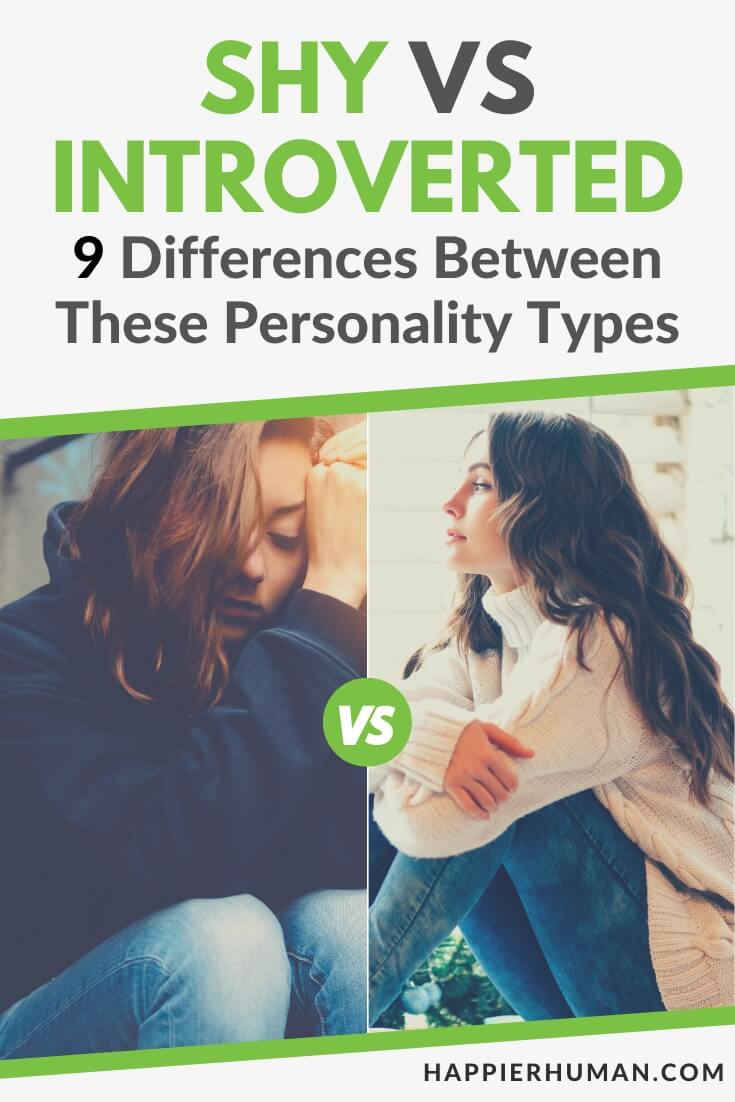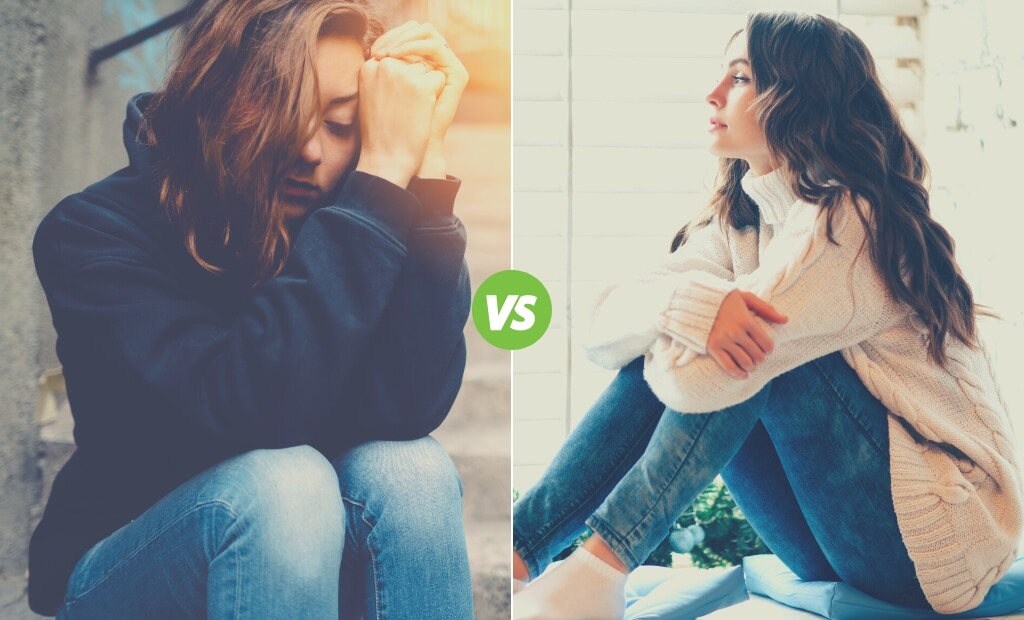I bet you never thought you’d be combing the internet for an explanation about shy vs introvert, have you? I lean more toward the introverted side on the introvert-extrovert scale. I’m also shy, but only in certain rare situations. That might indicate shyness isn’t an embedded or primary personality trait–just a sign of an introvert.
In short, being shy and being introverted are distinctly different. You’ll instantly start noticing the core differences once you read the definitions of shyness and introversion. You’ll learn why people become either of the two.
A little further down, we’ll explore the Myer and Briggs personality types. Who knows, you may discover you have an Introversion Sensing Thinking Judgement (ISTJ) personality just like I do.
Hopefully, this article provides all the info you’re looking for and a full understanding of the differences between shy and introverted. What you learn here can put you on a new path of self-discovery.
In fact, your overall life experience can improve significantly just by having greater self-awareness.
What Does Shy Mean?
Shyness is a mental state where an individual finds themselves excessively self-conscious and fearful of negative judgment in social settings. A tendency to be excessively focused on themselves in a negative way and excessively and negatively evaluating themselves are other key characteristics, according to Psychology Today.
Shy individuals have an ongoing sense of awkwardness in social settings and often feel embarrassed to speak or be in the presence of others. As such, they may avoid encountering people.
They also experience anxiety symptoms that show up in social settings. For example, uncontrollable blushing, shaking, sweaty palms, trouble finding the right words, and stuttering.
I can relate to most of these signs of shyness. As a young and extremely shy girl, I was afraid to speak to family members and strangers. I dreaded making eye contact. I always felt so self-conscious and unattractive and dreaded the limelight because of my poor self-image. What about you?
Why are Some People Shy?
Are we born shy? “The answer to that question is absolutely not!” says the personality psychologist, Bernardo J. Carducci, Ph.D. Carducci explains that shyness is related to a sense of self. Since our sense of self develops when we’re around 18 months old, we cannot be born shy.
He further noted that the first sign of shyness typically shows up around six months of age. Carducci is also the director of the Indiana University Southeast Shyness Research Institute and author of the book Shyness: A Bold New Approach.
Why then are some people shy? Researchers concluded that shyness is driven by both nature (biological) and nurture (environmental) factors. Temperament, a biological factor, influences the development of the characteristic. A baby with an extremely sensitive temperament is more likely to grow shy.
Shyness is also a learned behavior, according to behavioral experts. The behavior may result from social conditioning, childhood trauma, family expectations, or bullying.
What Does Introvert Mean?
An introvert is someone who is able to live satisfactorily without needing to socialize, as opposed to extroverts who have a persistent urge to stay socially connected. Introverts are generally quiet and easy-going by nature and typically have few trusted friends or acquaintances.
They tend to function better when alone and in quiet environments. They don’t rely on social gatherings or interacting with others to feel alive and worthy.
When desired, they’re able to self-induce excitement and enjoy their own company through activities like reading, writing, or meditating. As a result, they come across being shy, reclusive, or having an avoidant personality.
Why are Some People Introverted?
Introversion is a personality type introduced by the famous Psychologist, Carl Jung. As with shyness, introversion goes back to how the brain functions.
Studies show that introverted people rely less on dopamine, a neurotransmitter in the brain reward system that is responsible for pleasure reward and motivation.

Too much dopamine overstimulates and exhausts these individuals who prefer their solitude. As such, the ‘quiet ones’ are less interested in socializing to preserve their already low energy supply.
These calm and introspective individuals are usually in “energy-saving mode” since they prefer using the parasympathetic nervous system, which keeps the body in a more restful state. Marti Olsen Laney, Psy.D. explained more in her book “The Introvert Advantage: How Quiet People Can Thrive in an Extrovert World.”
9 Differences between Shy and Introverted
People frequently group shy and introverted people as one. Understandably so. They both display similar behavior, such as avoiding social situations and chatting with others. However, they do so for different reasons, as you’ll find out in the differences explained below.
#1. Unlike Shyness, Introversion is a Personality Type
A personality type is more of a fixed way of behaving as opposed to a characteristic that a person can change or overcome through self-help.
Shyness is an emotion that affects how a person feels and behaves around others, according to KidsHealth.org. Our feelings and emotions aren’t recognized as personality traits, although our personality can explain our emotional reactions.
Introversion, on the other hand, is one of two primary personality types introduced by Carl Jung. Extroversion is the other type.
#2. Shyness is Rooted in Low Self-Esteem Unlike Introversion
There’s a distinct difference in the reason why shy vs introverted individuals are not usually thrilled to be around others. Those who are shy typically avoid social situations because they struggle with low self-esteem, fear of judgment, and social anxiety.
When it comes to introverts, their avoidance of social situations has to do with their biological makeup. They prefer spending time alone or with familiar people, and it’s not because of feeling self-conscious or embarrassed. It’s more related to living a low-key life.
#3. Shy Individuals Avoid Socializing Because of Negative Self-image While Introverts Avoid to Save Energy
If you’re a shy one, you probably feel utterly timid or embarrassed to socialize, particularly with strangers. Feeling this way comes from having a negative view of yourself and mistakenly thinking people see you the same way.
For introverts, their avoidance has to do more with having a low threshold for social interaction. Their brains are wired to be in rest mode to help save emotional energy.
No wonder they tend to leave social events pretty early or at the height of the fanfare. Quitting early prevents them from feeling overwhelmed.
Some of it can be attributed to social anxiety, a condition anxious introverts struggle with.
#4. Shyness Can Come from Insecurity But Not Always the Case with Introverts
As an introvert, you might be mistaken as someone who’s shy if you “shy away” from social interaction (pun intended).
You remain in your seat at social gatherings when others mingle, only because you’re more of an observer than someone who likes to be in the thick of things. You choose to ‘take a back seat’ but not because you feel insecure or have low self-worth.

Your shy counterpart is more than likely dealing with insecurity. Doubting themselves is a part of their makeup.
They’re more likely to avoid social events altogether to prevent the uncomfortable feelings and symptoms such as fear and trepidation associated with shyness.
#5. Shy People are Always Shy While Introverts Aren’t
Introverts can be shy, but that’s not always the case. It depends on the setting and who they’re interacting with. In some cases, the feeling gradually fades away, the more they get comfortable around a particular person.
Shy individuals learn to be timid and that becomes their default persona. On any given day or time of day, you can bet your bottom dollar they will experience an intense fear of interacting in unfamiliar social settings.
#6. Shy Individuals Can be Extroverted but Introversion is Fixed
I don’t believe there’s such a thing as a half-introvert, half-extrovert. Based on the introversion-extroversion scale, one personality type is more dominant. With this in mind, you’ll notice that introverts are far less outgoing or hyperactive than extroverts.
Their outgoing characteristics may be more noticeable in certain instances, although quite fleeting. Before you know it, they’re back in their place of solitude, minding their own business, and seemingly avoiding everyone.
Surprisingly, shy people can be extroverts, too. According to a Simply Psychology article, Can Extroverts Be Shy? personality traits do not prevent someone from experiencing social anxiety.
Extroverts get their energy from being around people. Interestingly, their innate need to socialize is the same thing that triggers insecurity, awkwardness, and other symptoms of shyness.
#7. Shyness Relates to a Fear of Social Interaction, but Not Introversion
A fear of social interaction is a symptom of social anxiety and emotion commonly experienced by shy individuals in unfamiliar social environments. The fear is often so extreme that doctors describe it as social phobia, a mental health condition.
On the flip side, “introversion is a personality trait, not a mental health condition,” according to Mental Health America (MHA). Even though introverts can experience social anxiety, the root cause is different compared to those living with persistent shyness.
For them, their anxiety and people-avoidance relate to wanting to avoid exhausting their energy. With shy individuals, social avoidance is rooted in fear and is the only way to feel calm and safe.
#8. Shy Individuals Persistently Worry About What Others Think of Them but Not Introverts
Since shy people struggle with self-consciousness and poor self-image, they’re often preoccupied with what others think of them. Worrying stems from fear of negative judgment and criticism and how they view themselves.
If you can relate, you’d be surprised to know others are actually thinking more about themselves and their own challenges.

You’ll also find that an introvert can be as confident as an extrovert. The difference is they don’t like being the center of attention. As an introvert myself, I can reassure you that I’m hardly concerned about people’s opinions of me.
If you’re also introverted, you know we live in our own self-created bubble and don’t care about the negative labels society gives to us. For example, shy, weird, and people averse.
Be sure to read my article on how to not care what others think and the book, Quiet: The Power of Introverts in a World That Can’t Stop Talking.
#9. Shyness is a Feeling You Can Overcome Unlike Introversion
Even though shyness is embedded internally, it’s still really a learned behavior. 70% of it stems from how we respond to our environment. Our genes are responsible for the other 30%. Not being a personality trait implies that you can overcome your excessive self-consciousness.
Remember, I was once extremely shy. Today, people find it hard to believe it!
We can’t say the same if you’re an introvert. A personality trait is inherent and largely stable. While it isn’t impossible to change certain personality traits, making the shift is not that easy. The task normally takes conscious and persistent effort.
Overcoming shyness also requires taking steps to manage anxiety related to being in public and talking to people.
The Myer & Briggs Personality Inventory
Katherine Briggs and Isabell Myers are the mother and daughter who developed the 16 introvert and extravert personality types from Jung’s introvert and extrovert personality theories. They also developed the Myer & Briggs Type Indicator (MBTI), a tool designed to assess an individual’s personality and why they have certain behavioral preferences.
The preferences are Introversion-Extraversion, Sensing-Intuition, Thinking-Feeling, and Judging-Perceiving.
Introversion and extraversion refer to how we get our mental energy. Next, is how we take in information from the environment, which can be through Sensing or Intuition. We also make decisions differently, some though Thinking and others Feeling. The final aspects, Judging and Perceiving describe the way we see the world.
When it comes to personality types, I am an ISTJ (introversion, sensing, thinking, judgment), as mentioned earlier. Once you take the Myer & Briggs personality test, you’ll get a personality profile showing which of the 16 personality types best describes you.
Knowing why you think and act the way you do can literally change your life. Not only that, it can positively affect how you interact with loved ones, friends, work colleagues, and the world at large.
Can you Change your Personality?
Carl Jung believed preferences or personality traits are inherent and don’t change, at least not automatically. Although Jung believed a person’s personality is hardwired, he also believed we have the ability to ‘flex’ those personality preferences.
What’s important is having the level of emotional intelligence to notice when to flex and when not to. If you remain rigid, you can hinder your personal growth and development.
Final Thoughts on Shy vs Introverted
There’s absolutely nothing wrong with being shy or introverted. At times, introverts display shy characteristics and vice versa. However, your core personality type tends to remain constant. Even then, your adaptability as a human allows you to change self-limiting behavior to improve your life experiences.
For example, shy people believe others are constantly evaluating them poorly, which causes them to forego social opportunities. This, in turn, limits their social skills and can reduce their quality of life. A change is possible, now that you have a better understanding of your behavior and personality preferences.
Keep your journey of self-discovery going by checking out 23 Fascinating Introvert Facts & Statistics to Learn in 2023 if you’re introverted… or 6 Authentic Ways to Deal with Social Anxiety in ANY Situation makes a great read if you’re shy.
Finally, if you want to identify YOUR personality type, then take one of these 11 personality tests to better understand what makes you tick.


